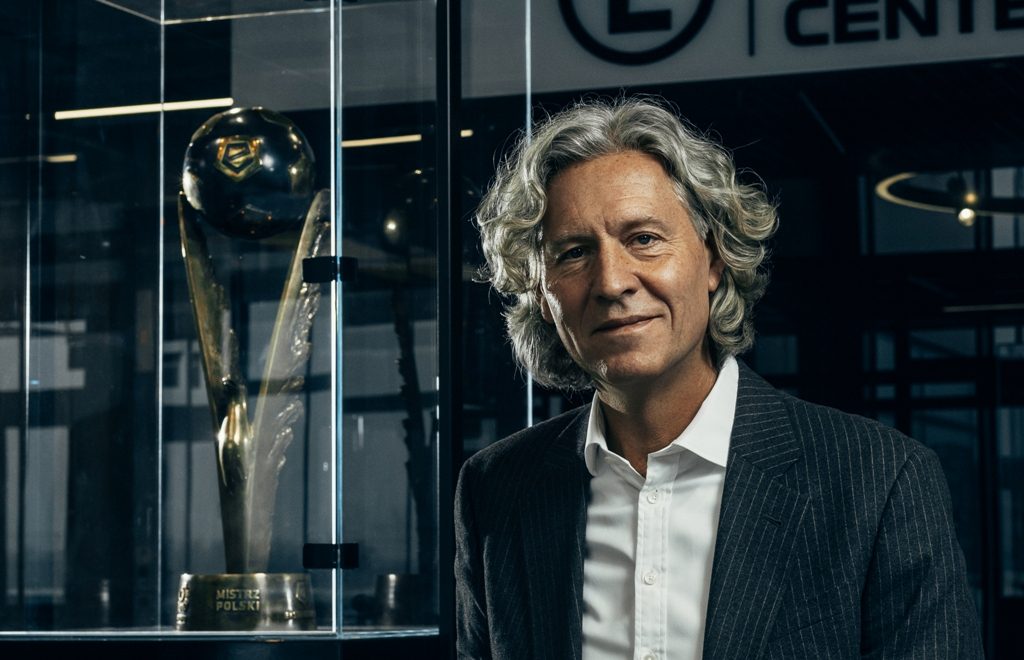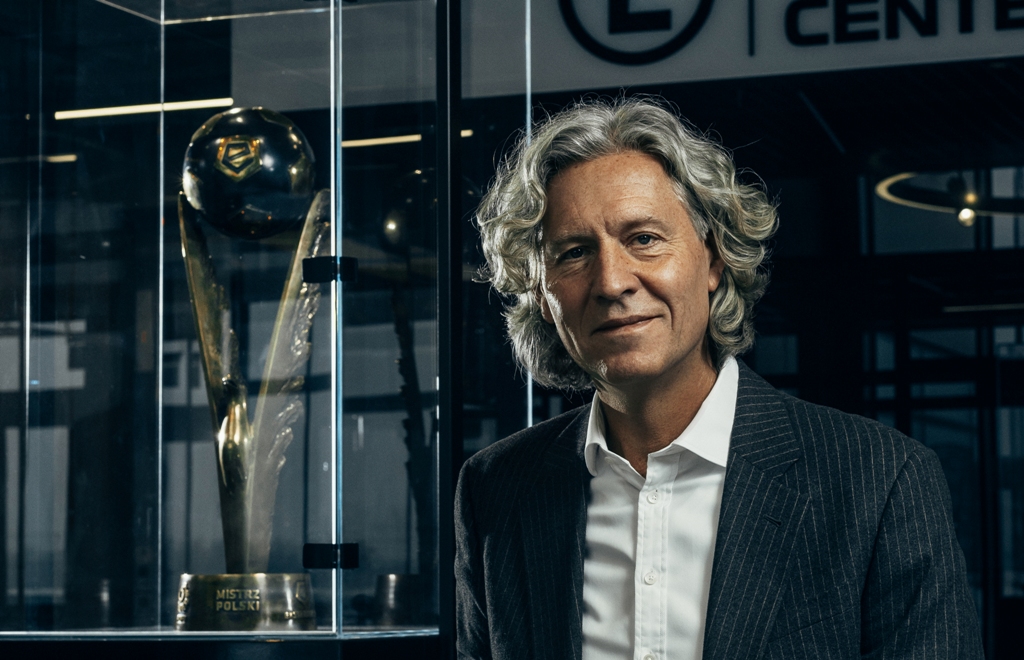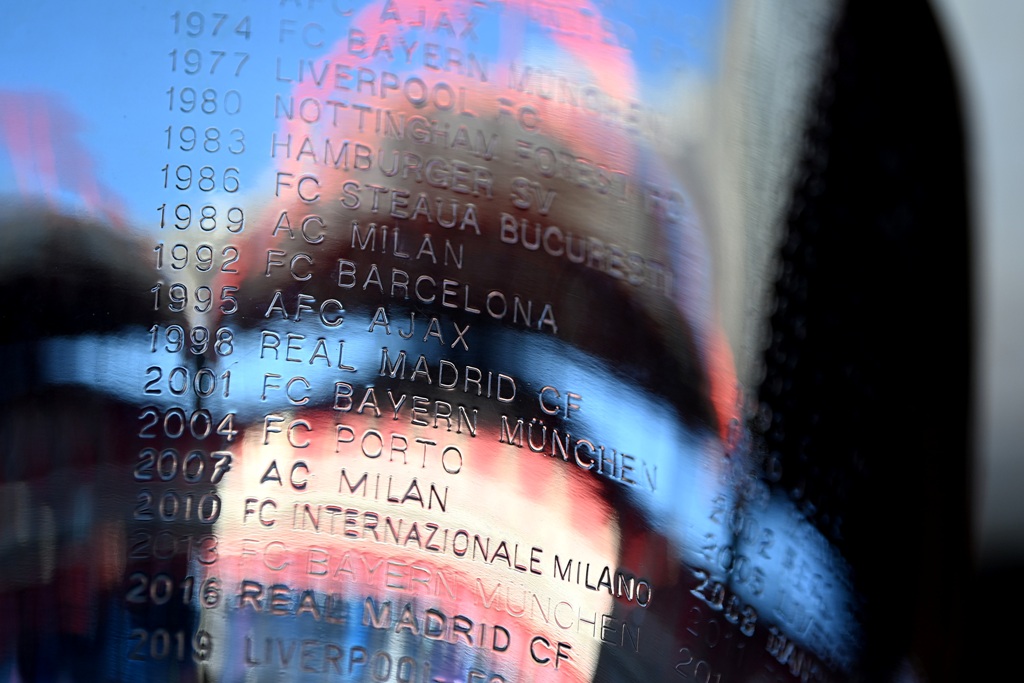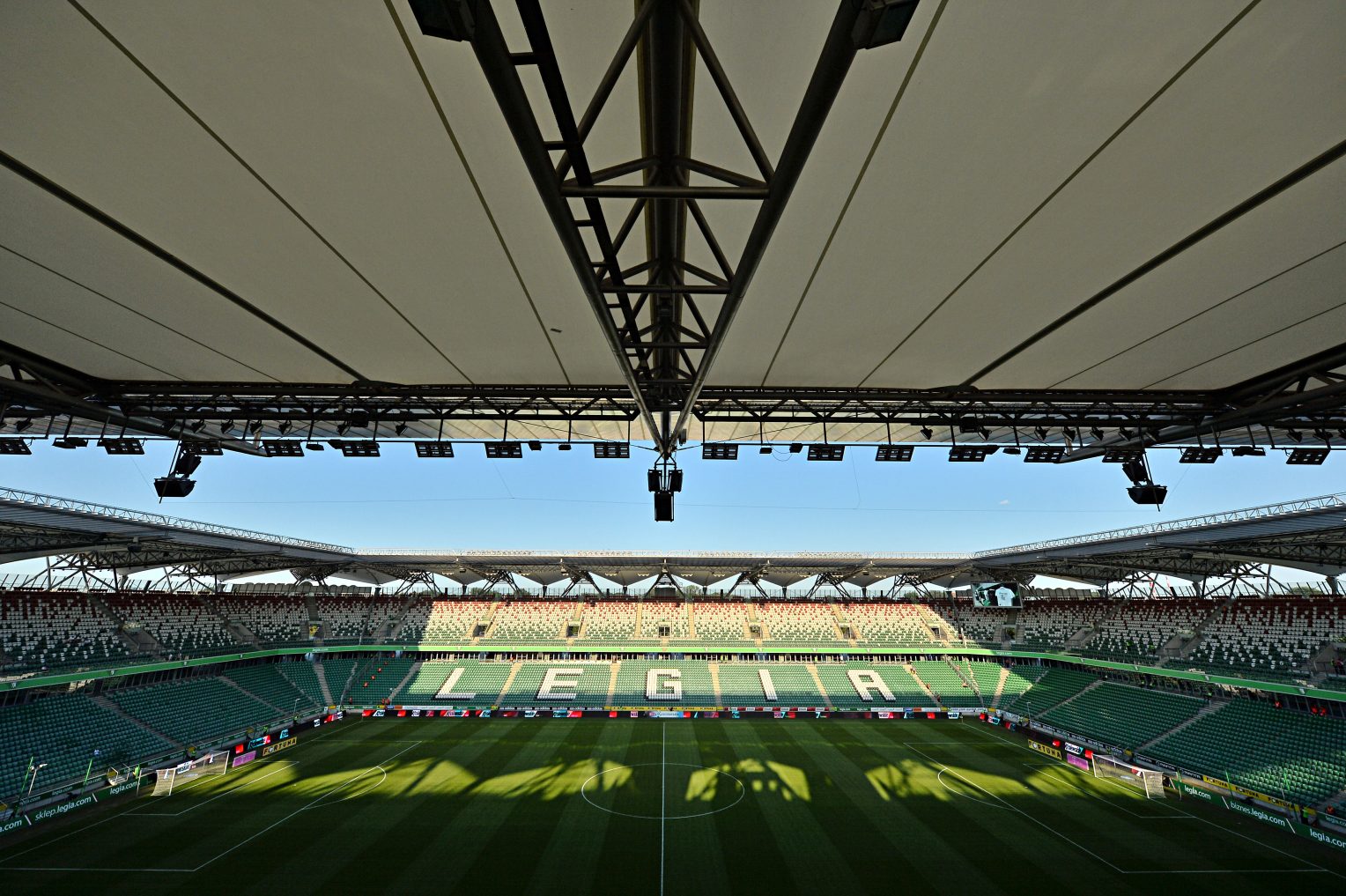Dariusz Mioduski: European Football Has To Change

Football is at a crossroads as it battles the effects of the pandemic and the growing polarisation of wealth and access to European competition, the impact of which will be profound without immediate change according to Dariusz Mioduski, Legia Warsaw President and Vice-Chairman at the European Club Association (ECA).
In February 2020, Italy became the epicentre of Europe’s coronavirus outbreak. As we watched games being cancelled and the unfolding panic at the rapid spread of the virus, football’s decision-makers remain bullish that the game would continue.
As we well know now, that was wishful thinking and as the weeks passed and the scale of the pandemic became ever greater, it eventually led to a complete halt of leagues across the continent for many months.
But as the time rolled on and virus’s spread steadily receded, it seemed like there was hope of a revival. With many leagues restarting in late summer 2020, the view was that 2021 would see a return to normality. However, the virus’s second wave has been more pronounced over the winter with new, more contagious variants emerging.
“Unfortunately I’m not an optimist when it comes to bringing fans fully back to the stadium this season,” was the stark message from the Legia Warsaw owner and President Dariusz Mioduski, as he discussed the impact the virus has and continues to have on the game.

The situation has had serious financial consequences for football clubs. Deloitte’s Sports Business Group estimated the top 20 clubs in Europe had lost an estimated €2bn as a result of the shutdown and playing behind closed doors. However, the ECA estimates the losses will be far greater with all clubs across Europe combined thought to have lost around €7bn to €8bn as a result so far.
Indeed, this year’s January transfer window was relatively restrained with clubs reigning in their spending. The Premier League, notable for its clubs’ excess during the window, spent little over £70m compared to the £160m splashed the year before – although the added impact of Brexit may also have had an effect on that.
There are no easy solutions to the problems that have surfaced as a result of the pandemic that has laid bare weakness in football’s financial foundations and the inequality within the game.
“Everyone is trying to save costs where it is possible,” Mioduski continued. “But the fact is that most of the costs are related to the players and the internal structures on the sports side and because of FIFA and UEFA regulations you can’t really do much with that.
“Yes, many clubs had negotiated a periodic reduction of salaries last season but now everything is largely back to normal. The system of club licensing and lack of any salary cap mechanism gives players and agents the upper hand in discussions in a hugely competitive market.”
It’s a strong criticism of the way in which football’s cost base is structured which has seen many non-playing staff furloughed or made redundant as a result of intense cost-cutting measures throughout Europe’s clubs. Mioduski‘s opinion is that they will be forced to become thriftier and more risk averse in their negotiations in the coming years but also says there is a far greater challenge to the transfer market.
“We are in a competitive business. In the end we are all trying to win the league and we like to play in Europe so it’s very difficult to function fully rationally in that environment.
“There is no global agreement or regulations between the clubs on how they manage their costs – this is the main difference between European and US sports where they have collective bargaining agreements with players and fixed cost structures with penalties for exceeding those.
“In addition, there is an extra complication spanning from different ownerships structures across Europe; from clubs owned by individuals, to fan associations, to local municipalities and quasi-national government institutions. This causes completely different approaches to the role and objectives for each set of owners.
“I think more and more clubs today are understanding that in European football, we have to start thinking about introducing mechanisms allowing us to control costs in a hugely competitive environment. We cannot have a system where the cost spiral is unlimited. There has to be more understanding on the part of FIFA and UEFA, but also at the European Commission, that the industry needs to be run in a responsible way and that European football will benefit from it.”
So what is the answer and what say does the ECA have in this? Mioduski believes that part of the solution has to be through further strengthening of regulations and changes in the structures that govern the way European club competitions are organised.
“The ECA has the key role as the counterparty organisation for UEFA and FIFA. Since the clubs are bearing the majority of the economic risk of the business, we need to address with UEFA, how European competitions are managed and commercialised but also how to introduce mechanisms allowing clubs to continue developing and to manage their business in a better way.
“Today, from my perspective, we need to realise that European football is at a certain crossroads. In 2024 the current agreement between ECA and UEFA and FIFA expires and new ones need to be signed. The existing system and regulations governing the game, including those affecting European competitions and access to those competitions are not really working. The last several years in particular have been really disastrous in terms of the growing polarisation between the few and the rest. That has to be addressed somehow because if it is not, it will lead to even greater inequality and eventually a loss of interest in football in large parts of Europe.”

At the heart of the problem, Mioduski says, is a systemic and regulatory fault that forces clubs across Europe to compete for talent [players] on the European and even global market, but at the same time those clubs are restricted to earning revenues in their domestic markets by playing in national leagues.
This has been further amplified by gradual changes to the access rules for European competitions [Champions and Europa Leagues] with domestic preference for the so called top four or five leagues. The effect of this has been the growing attractiveness and dramatically increased ability of those leagues’ clubs to attract the best talent. As a result the sponsorship and media rights value growth there has also been dramatic.
Mioduski turns his attention to the revenue growth of many clubs in these top leagues. “During a relatively short period of time, not only the best clubs from those leagues have been able to note the many–fold increases in their budgets, but also the smallest of clubs from these leagues now have budgets many times surpassing even the historic, big clubs with millions of fans from other European capitals and other large cities,” he states.
“Unless this problem is addressed, it will lead to decline of football as we know it in Europe. This is why ensuring access to European competitions, including the Champions League, for clubs across the whole of Europe – not focusing only on the top five countries – is part of the solution.
“Today’s reality in most European countries is that interest in domestic football is largely driven by participation of local clubs in European Competitions. For example, in Poland, if Polish clubs are not playing in the Champions League or Europe League the perception of the domestic leagues and interest in it drops. It negatively affects attendance and value of media rights and sponsorships. In the end, it negatively affects local interest in the sport, with people perceiving it as an inferior product.
“I am a pragmatist. I realise that it is money that today drives the industry. I don’t expect and want that football goes back to the old days and closed borders. But I believe we must try to create the conditions and environment for football to continue developing all across Europe and not only in five countries. The introduction of the Europa Conference League as the third competition is a step in the right direction but it is not sufficient.
“Systemic solutions including those addressing access to the Champions League and Europa League should also be developed and at least allow the leading clubs from across Europe to compete against each other on a more level playing field. At the same time, proper solidarity and training compensation schemes have to allow for smaller clubs and leagues to continue developing as this is in the interest of European football as a whole.”
In 2019, Mioduski wrote an open letter to the boards of European clubs and leagues addressing the access issue and the situation around distribution of revenues generated from European competition. In it he noted the inequality of access and the unfair distribution of revenues to those clubs outside the top five leagues. But does he feel there’s an appetite for change? Certainly not among those who, for him, are the main beneficiaries of the current system – the top five leagues themselves.
“To tell you the truth, I don’t see much of a willingness among the top five leagues to change the current system, because it’s those leagues that are the biggest beneficiaries of the current system,” he said.
“This interest has to come from UEFA and the European clubs because today, these leagues are using UEFA’s competitions system as an advantage for themselves to build their own products.
“The Premier League is competing with the Champions League, and LaLiga and the Bundesliga are doing the same. The Italian and French leagues are following that path too. At the same time there are also internal pressures in those five leagues leading towards a breakaway league because there are a few big clubs in each of them who see themselves as global brands with everyone else riding their coattails.
“There are no simple solutions,” Mioduski suggests, ” but I can imagine a system promoting the development of football across the whole of Europe and ensuring that most countries and all regions will have strong representation at the top of a wider pyramid. As long as we have borders limiting the ability of clubs to compete for revenues outside of their domestic markets, we will need to adjust the access rules for top European competitions to favour the best long-term performers from all European countries and not second tier performers from few selected leagues.
“In other words, individual performance of the club domestically and internationally should be rewarded and not the fact that it plays in the same league as Real, Juventus, Manchester City, PSG or Bayern.
“Of course this would have to be combined with a set of strong solidarity and rewards mechanisms for clubs which are not participating in Europe, so they can continue developing and investing in player development and football and commercial projects.
“Although not perfect, this would recognise today’s financial realities that the industry faces but would keep football relevant across Europe by proper domestic and regional representation. In sports we all need our local heroes, local clubs and local inspirations, except “local” no longer means your city, but rather your country or region at an international level.”
So how has this last year of pandemic affected this thinking and European clubs? Over the course of the year the financial structure of many clubs has been severely tested and Mioduski thinks the bigger clubs in all countries are bearing the brunt of the losses. “I think this will affect the bigger clubs more than the small clubs because the exposure of a matchday plays a much bigger role on their finances,” he said.
“In Poland we have 16 teams in the top league, and I would imagine only a minority of them are significantly impacted by the fact that we are playing without our fans. For us [Legia] 30% of our revenues are related to matchday and this is quite a big part of our budget. There are maybe one or two others who have a similar structure.

“There are many smaller clubs which are playing with good infrastructure and good stadiums but because they have smaller attendances or are located in smaller cities, their matchday revenues are not a significant part of their budget. There is an inherent inequality but still, everyone is suffering in some way.”
As Mioduski harbours ambitions for a more equitable football landscape his sights are firmly set on developing Legia Warsaw’s standing beyond its domestic territory. From the heady heights of the 1970s where the club, based in Poland’s capital city with a population of approximately 3 million, was ranked among the top ten in the world, to the lows following the collapse of Communism across Eastern Europe, they have consistently been one of the leading clubs in the country.
Indeed, Legia is a much storied club whose history extends beyond football with over 100 Olympic medals across a vast range of disciplines – “more medals than many countries have” Mioduski proudly acknowledges.
“We have the fundamentals that allow me to believe, and help us work towards, becoming among the top clubs in Europe and potentially a global brand. Poland is the sixth largest country in Europe with a market of 40 million people and is its 8th largest economy. There are also around 20 million Poles living outside the country.
“These are the fundamentals that we are using to build the future commercial success of the brand. I look at Legia not only as a football brand but a football, sports, entertainment, media and lifestyle brand.
“We’re investing in all parts of commercial development to allow us to achieve that. Of course all that depends on how successful we are on the pitch. Without that, building a fully international brand is impossible.”
Success on the pitch is key to Legia’s success off it and they have concentrated largely on developing their playing talent in recent years. In the summer of 2020, Legia completed the €25m construction of their training centre, a significant investment that is a crucial part of the club’s ambitions.
“We have built the most modern training facility in Poland which we completed half a year ago and we are heavily investing in our academy system taking advantage of being a leader in a large market with talented and hardworking youth. But it’s not just infrastructure we’re investing in, its people and skills too.
“We were one of the first clubs in Poland to have a new stadium built around ten years ago but we lacked training and academy infrastructure. We only had one training pitch next to the stadium so we couldn’t really develop our talent properly. Today we have the most modern training facility with eight pitches and everything our players need to develop.
“We are also focusing on technology, analytics and the solutions that will help us to develop our game and our players. We are probably among the most advanced clubs in the region but I believe we are at the beginning of the road and there is still a long way to go. We are very conscious of the necessity to go in that direction both off the pitch in terms of commercial development and also on the pitch with our football development. We will be relying on the knowledge and technology in the future.”
Legia’s lead in this type of investment is having a ripple effect across Poland’s clubs with others investing in their training and academy infrastructure which Mioduski is confident will serve to help strengthen the league and improve the standing of Polish football in Europe.
“I’d like to think that we are leading the way and clubs in Poland have recognised that this is a critical investment. We have quite a competitive league; our problem today is that our young players are leaving too early. We need to address and change this.
“Participation and success in European competitions is the key to the future and I think clubs in Poland are realising that and are investing in order to achieve it. Today investment is mostly in infrastructure but now should come investment in knowledge – coaches and managers as well – and this is slowly starting to happen. I see a bright future.”
Mioduski is optimistic, if not pragmatic, of the future for football not only in his home country but across Europe. He sees a bright future but only if there are significant changes made across the board. His leadership at Legia places him well to understand some of the pressures faced by clubs outside the top five leagues where despite their domestic success, they can never quite reach the highs in European competitions.
Concluding our discussion, Mioduski made the admission which he thinks is the most pressing for the entire football family to address regardless of where they are from.
“I’m afraid that the biggest problem is not really the financial losses today. Hopefully we can deal with this and survive,” he stressed.

“The main problem that I see is people’s habits changing. There’s a new normal. On a weekend you were thinking about going to the game. But that product now is under pressure, it’s not really the same without the fans – even on TV it looks different.
“This is what I am most concerned about and we as an industry will really have to work hard to bring people back and engage them emotionally as they were before. It’s not just getting over the restrictions, it’s about returning to the habit where football becomes part of your daily routine and this will require involvement of your local teams across the continent and not only a selected few global entertainment brands.
“The choices for customers today are immense and we need to understand that and be humble about that so we don’t lose these fans. And particularly young fans because they don’t consume our sport like in the old days. They think differently – if we lose that generation, or couple of generations, it’s going to have quite a negative effect on the industry for a long time.”
Images: Legia Warsaw





